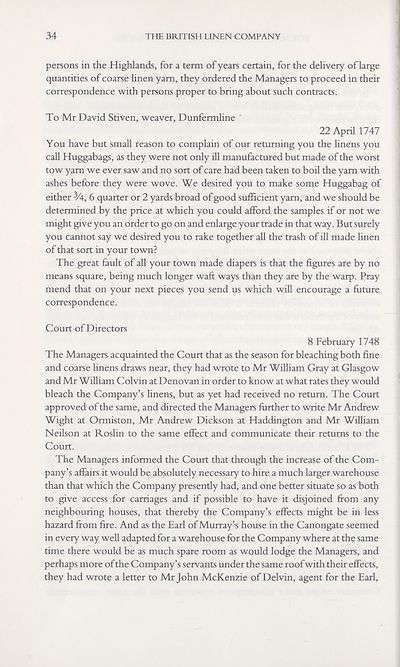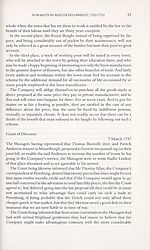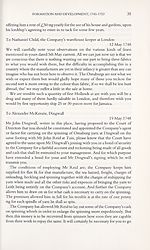Series 5 > British Linen Company, 1745-1775
(51) Page 34
Download files
Complete book:
Individual page:
Thumbnail gallery: Grid view | List view

34
THE BRITISH LINEN COMPANY
persons in the Highlands, for a term of years certain, for the delivery of large
quantities of coarse linen yam, they ordered the Managers to proceed in their
correspondence with persons proper to bring about such contracts.
To Mr David Stiven, weaver, Dunfermline
22 April 1747
You have but small reason to complain of our returning you the linens you 1
call Huggabags, as they were not only ill manufactured but made of the worst !
tow yam we ever saw and no sort of care had been taken to boil the yam with i
ashes before they were wove. We desired you to make some Huggabag of ,
either 3/4, 6 quarter or 2 yards broad of good sufficient yam, and we should be
determined by the price at which you could afford the samples if or not we
might give you an order to go on and enlarge your trade in that way. But surely
you cannot say we desired you to rake together all the trash of ill made linen
of that sort in your town?
The great fault of all your town made diapers is that the figures are by no
means square, being much longer waft ways than they are by the warp. Pray
mend that on your next pieces you send us which will encourage a future
correspondence.
Court of Directors
8 Febmary 1748
The Managers acquainted the Court that as the season for bleaching both fine
and coarse linens draws near, they had wrote to Mr William Gray at Glasgow
and Mr William Colvin at Denovan in order to know at what rates they would
bleach the Company’s linens, but as yet had received no return. The Court
approved of the same, and directed the Managers further to write Mr Andrew
Wight at Ormiston, Mr Andrew Dickson at Haddington and Mr William
Neilson at Roslin to the same effect and communicate their returns to the
Court.
The Managers informed the Court that through the increase of the Com¬
pany’s affairs it would be absolutely necessary to hire a much larger warehouse
than that which the Company presently had, and one better situate so as both
to give access for carriages and if possible to have it disjoined from any
neighbouring houses, that thereby the Company’s effects might be in less
hazard from fire. And as the Earl of Murray’s house in the Canongate seemed
in every way well adapted for a warehouse for the Company where at the same
time there would be as much spare room as would lodge the Managers, and
perhaps more of the Company’s servants under the same roof with their effects,
they had wrote a letter to Mr John McKenzie of Delvin, agent for the Earl,
THE BRITISH LINEN COMPANY
persons in the Highlands, for a term of years certain, for the delivery of large
quantities of coarse linen yam, they ordered the Managers to proceed in their
correspondence with persons proper to bring about such contracts.
To Mr David Stiven, weaver, Dunfermline
22 April 1747
You have but small reason to complain of our returning you the linens you 1
call Huggabags, as they were not only ill manufactured but made of the worst !
tow yam we ever saw and no sort of care had been taken to boil the yam with i
ashes before they were wove. We desired you to make some Huggabag of ,
either 3/4, 6 quarter or 2 yards broad of good sufficient yam, and we should be
determined by the price at which you could afford the samples if or not we
might give you an order to go on and enlarge your trade in that way. But surely
you cannot say we desired you to rake together all the trash of ill made linen
of that sort in your town?
The great fault of all your town made diapers is that the figures are by no
means square, being much longer waft ways than they are by the warp. Pray
mend that on your next pieces you send us which will encourage a future
correspondence.
Court of Directors
8 Febmary 1748
The Managers acquainted the Court that as the season for bleaching both fine
and coarse linens draws near, they had wrote to Mr William Gray at Glasgow
and Mr William Colvin at Denovan in order to know at what rates they would
bleach the Company’s linens, but as yet had received no return. The Court
approved of the same, and directed the Managers further to write Mr Andrew
Wight at Ormiston, Mr Andrew Dickson at Haddington and Mr William
Neilson at Roslin to the same effect and communicate their returns to the
Court.
The Managers informed the Court that through the increase of the Com¬
pany’s affairs it would be absolutely necessary to hire a much larger warehouse
than that which the Company presently had, and one better situate so as both
to give access for carriages and if possible to have it disjoined from any
neighbouring houses, that thereby the Company’s effects might be in less
hazard from fire. And as the Earl of Murray’s house in the Canongate seemed
in every way well adapted for a warehouse for the Company where at the same
time there would be as much spare room as would lodge the Managers, and
perhaps more of the Company’s servants under the same roof with their effects,
they had wrote a letter to Mr John McKenzie of Delvin, agent for the Earl,
Set display mode to:
![]() Universal Viewer |
Universal Viewer | ![]() Mirador |
Large image | Transcription
Mirador |
Large image | Transcription
Images and transcriptions on this page, including medium image downloads, may be used under the Creative Commons Attribution 4.0 International Licence unless otherwise stated. ![]()
| Scottish History Society volumes > Series 5 > British Linen Company, 1745-1775 > (51) Page 34 |
|---|
| Permanent URL | https://digital.nls.uk/127331661 |
|---|
| Description | Over 180 volumes, published by the Scottish History Society, containing original sources on Scotland's history and people. With a wide range of subjects, the books collectively cover all periods from the 12th to 20th centuries, and reflect changing trends in Scottish history. Sources are accompanied by scholarly interpretation, references and bibliographies. Volumes are usually published annually, and more digitised volumes will be added as they become available. |
|---|


